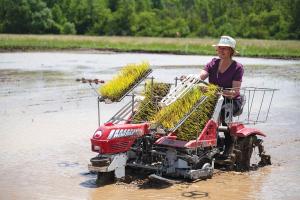2024 - Volume #48, Issue #4, Page #25
[ Sample Stories From This Issue | List of All Stories In This Issue | Print this story
| Read this issue]
Cornell Researches Rice In New York
 |
Though rice is traditionally grown in flooded paddies within the tropics, the grain is well-suited for a variety of growing conditions. That makes it appealing for Northeast farmers facing changing weather conditions that affect the severity and frequency of rain and flooding. Many farmers have left their most flood-prone land to grow fallow, but cultivating rice might offer an attractive alternative.
“The goal of the project is to provide farmers with the tools and training needed to grow rice locally, using sustainable and regenerative methods,” says Jenny Kao-Kniffin, Ph.D. and Associate Professor for Cornell’s School of Integrative Plant Science. “We’re starting the second year of testing agronomic techniques that focus on integrated pest management (IPM), and we’re examining different rice varieties that are appropriate for New York’s climate.”
While flooded paddies are the traditional way to grow rice, standing water isn’t required. In fact, rice is the only major crop that can take oxygen out of the air and send it down to its roots. The primary reason rice paddies are flooded is to suppress weeds for easier cultivation.
Many farmers feel overwhelmed by the steep learning curve of rice cultivation. Most necessary equipment, including a harvester, dryer, planter, dehuller, and polisher, must be imported from Japan. However, they’re often available second-hand and are specially designed for use on small plots of land. Cornell’s research program aims to break down barriers like this so rice cultivation becomes more accessible.
To date, Cornell’s research program is tracking two demonstration plots: one in flooded conditions and the other in a dry field. Between the two, they aim to replicate the range of conditions New York farmers will increasingly face. For example, due to flooding, one test paddy at the Homer C. Thompson Vegetable Research Farm was decommissioned from cultivation 15 years ago. Both experiment plots use varieties that grow in the upper limits of their range—including Northern Japan, Korea, Ukraine, and even Russia. These cold-hardy varieties have the best chance of thriving.
So far, the research shows that rice is surprisingly profitable. Some farmers net $12,000 or more per acre of rice production, over 15 times more than they could expect off a corn harvest. However, it’s far from free money. Cultivating rice is an intensive process that requires a lot of labor. That’s why many farms see rice as an add-on for farmers growing other food-grade grains, including corn, soybeans, wheat, and oats. It’s a convenient crop to sneak into field spaces that tend to be too prone to flooding for reliable use.
The research program is also producing online rice cultivation guides and researching the most suitable growing areas across the Northeast. Cornell’s research department is assessing state maps of flood risk, topography, and existing land use to determine which areas show the most potential for rice production. “We’re currently researching ways to minimize greenhouse gas emissions and reduce water use so that New Yorkers can enjoy locally grown rice that increases wildlife habitat and strengthens local economies,” says Kao-Kniffin.
The goal is to focus on existing agricultural floodplains rather than converting natural areas or wetlands into paddies. Further research will investigate how rice fields affect habitat space, stormwater, pollution mitigation, and other factors.
In the long run, Cornell hopes its research will help farmers dedicate small portions of their land to rice production, gradually expanding as they learn the nuances of this unconventional crop for American farmers.
Contact: FARM SHOW Followup, Professor Jenny Kao-Kniffin (jtk57@cornell.edu).

Click here to download page story appeared in.

Click here to read entire issue
To read the rest of this story, download this issue below or click here to register with your account number.




